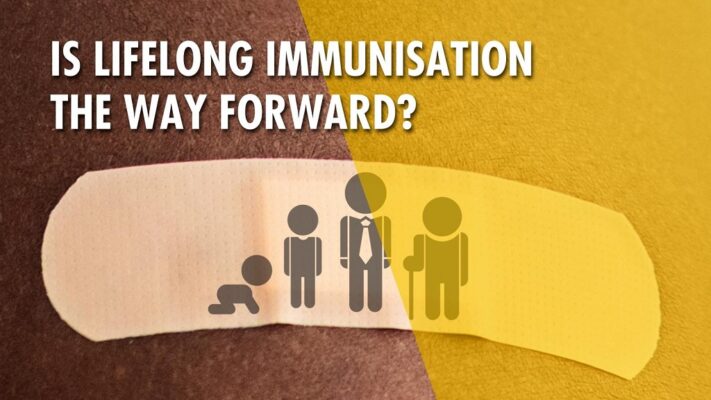Vaccines reduce older people’s risk of a wide range of diseases, including influenza, pneumonia, herpes zoster and COVID-19. And, for vaccinated people who catch these diseases, the risk of dying or being hospitalised is much lower.
But some vaccines can also indirectly reduce the chances of developing diabetes or serious cardiovascular disease ‒ a fact that doctors say is not well known.
Story at a glance
- Vaccination prevents infections and reduces the risk of serious illness
- This reduces mortality and disability, improving quality of life
- Reduced hospitalisation and long-term illness eases pressure on hospitals
- Vaccine uptake is too low among older people
- An expert group has published a 5-point plan to boost vaccination rates
‘We mustn’t forget that infectious diseases are a leading cause of disability in older adults,’ says Dr Jean-Pierre Michel, Professor of Medicine at Geneva University Medical School in Switzerland. ‘It is also clear that not enough attention has been given to the positive outcomes of immunisation on cardiovascular and neurovascular events in the older population.’

Dr Michel, who heads up a large geriatric ward at the Geneva University Hospitals, says that while the world’s population is ageing, vaccination is still viewed primarily as a matter of childhood health. He advocates a life-course approach to vaccination and encourages patients, physicians and policymakers to consider the impact of vaccination on mortality and quality of life.
For example, people with heart failure can reduce their overall risk of dying by 30% if they are vaccinated against influenza. There are similar benefits for people with diabetes, kidney disease and COPD (a long-term lung condition) ‒ if they are vaccinated. And there is emerging evidence of a reduced risk of Alzheimer’s disease for those who have their annual flu jab.
And it’s not just influenza vaccines. People aged 65 years or older who are vaccinated against pneumococcal disease are 17% less likely to have a heart attack; herpes zoster vaccination halves the risk of stroke; and hepatitis B vaccination is associated with a lower risk of developing diabetes.
Given the significant benefits to individuals ‒ and the potential to reduce pressure on busy hospitals ‒ why are too few older people in Europe vaccinated against flu, pneumococcal disease and other preventable illnesses?
‘Vaccine hesitancy is a problem for people at all stages of life,’ says Dr Michel. Some people perceive a low risk of infection or do not trust vaccines and the health system. The Covid-19 infodemic further undermined trust through the overabundance of misinformation.
‘Despite the public health triumphs of vaccines, or perhaps even because of these successes, the ravages of vaccine-preventable diseases have been forgotten,’ he says, calling for investment in education for healthcare professionals and the public to highlight the value of vaccines for older people.
‘We also need clear guidelines and recommendations to highlight the role of vaccination in healthy ageing,’ Dr Michel added.
Improving vaccine confidence
Dr Michel was among a group of experts to take part in a meeting convened by the International Federation on Ageing in Brussels in July. Based on a wide range of expert input, the group has developed a five-point set of recommendations designed to improve uptake of vaccines among vulnerable groups.
- Effective and targeted communication strategies
Use positive and data-informed communication to highlight the benefits of immunisation (rather than the consequences of disease). - Knowledge generation through data collection
Collect information on the provision of vaccination services and vaccine coverage rates. - Immunisation guidelines for older and vulnerable populations
Devise and implement clear guidelines tailored to key target groups, with input form experts in geriatrics and healthy ageing. - Broadening prioritisation of vaccination across the health workforce
Improve vaccinology education for all healthcare providers to support immunisation throughout the life course. - Integration of a life-course approach to immunisation across health systems
Make life course immunisation central to public health messaging and in education in schools and workplaces, while expanding the role of pharmacists and other in administering vaccines.




